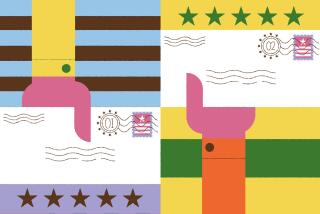Diving to Be Free : Armenia May Be Independent, but Djavadian Likes the U.S. and Doesn’t Want to Go Home
- Share via
Arsen Djavadian came to the United States with a rug, a swimsuit and an eye out for the KGB. It was his desire to live here and compete as a diver on the U.S. Olympic team.
But the rug, politically speaking, has been pulled from under him. He is drowning in red tape, and Djavadian (pronounced Ja-VAD-ee-an) cannot understand why everything is so complicated.
In a best-case scenario--barring an act of Congress--he will not be able to dive for the U.S. Olympic team until the year 2000, when he will be 33.
Diving was Djavadian’s ticket out of Soviet Armenia. It may never be anything more.
Sixteen months ago, with the help of St. Louis sports promoter Joe Farrell, Djavadian stole away from the athletes’ village at the Goodwill Games in Seattle and applied for political asylum.
In his application he said he had suffered persecution for his religious and political beliefs. Twice, he claims, he was imprisoned for participating in demonstrations protesting the former Soviet government’s refusal to unite the Norgorno Karabakh district in Azerbaijan with Armenia.
When Djavadian failed to return to the Soviet Union with the rest of the Goodwill Games diving team in July, 1990, his father Boris lost his job as a government economist and his brother Aram was expelled from a university.
Terrified, Djavadian believed he would be imprisoned for the rest of his life if he were forced to return to the Soviet Union.
Under normal circumstances, a decision on Djavadian’s application for asylum would have been rendered by February. But administrative red tape and the political upheaval have delayed a response.
In late September, Armenia gained its independence by a 99% vote. Consequently, the threat of imprisonment may no longer exist for Djavadian.
On that basis, his application could be denied and Djavadian, who has taken an apartment in Van Nuys, would be deported.
Certainly, life is rapidly changing in Armenia.
A year ago, when The Times contacted Hrach Chandirian, Djavadian’s diving coach in Armenia, Chandirian refused to answer questions for fear that the KGB was monitoring the phone call. In a recent telephone conversation with sports officials in Armenia, they freely answered all questions about Djavadian’s defection.
The situation also has improved for Djavadian’s family. His father has a new job and his brother is back in school.
“Everybody is so happy, so safe,” Djavadian said. “I’m so happy about that.”
But Djavadian does not want to return. He is adamant about remaining in the United States.
“I like freedom,” he said. “I like this country. No one tells you what you must do or pushes you. You have choices. You can decide what you want to be, and be it.”
If deportation proceedings are begun, William Bennett, Djavadian’s attorney, said he will base his argument against deportation on the volatile political conditions in Armenia.
“While the events in his home region will definitely have an effect on his case, I would always argue that the legal and political situation is still explosive,” Bennett said. “Look at Haiti. They’ve had three or four coups in the last three years.
“(The Immigration and Naturalization Service) withheld a decision on Arsen. Lord knows, during the (Soviet) coup it would have been granted.
“The (United Nations) protocol itself has a difference of opinion on this with the U.S. attorney general. We’re not going to return Vietnamese refugees if they establish a democracy there. And there’s an awful lot of Jewish people fleeing Eastern Europe and the (former) Soviet states. They say no matter what form of government, they are discriminated against.
“Who knows? The Armenian state could adopt communism. It’s a complex issue. That’s why I think the U.N. is right. They don’t punish someone who flees by sending them back once they think their country is not dangerous.”
But Duke Austin, a spokesman for the INS, said that applications for asylum have to be judged on the current conditions in the country from which someone is seeking refuge.
“So you don’t take applications based on what the Nazi government did,” Austin said. “The likelihood you will be persecuted upon your return you weigh against current conditions. And it is up to the alien (asylum applicant) to establish that, not us.”
If the INS denies Djavadian’s application, the case faces a maze of legal and bureaucratic proceedings that could take years to resolve, Bennett said.
Perhaps Djavadian’s life would not be endangered were he to be deported. The same cannot be said of his future in diving.
The situation in the former Soviet Union is so unsettled that there is no telling what athletics there will become.
And lacking U.S. citizenship, and therefore the opportunity to compete for a berth on the U.S. Olympic team, Djavadian had hoped that Armenia would field a team for the 1992 Olympic Games.
His plan was to meet the team in Barcelona, dive for his homeland and then return to the United States.
But Armenia will not enter an independent team. And even if it did, Djavadian would not be able to re-enter the United States, a detail he initially overlooked.
Knowing what he knows now, that Armenia would gain its independence 14 months after his escape, Djavadian said he has no regrets.
“I would still leave because I think about (leaving) all the time for three or four years,” Djavadian said.
Even if Djavadian’s application for asylum is approved, the delay already might have prevented his diving for the United States in the 1996 Olympics.
From the time asylum is granted, it can take 18 months to gain permanent residence. The wait for citizenship from that point is five years--unless Djavadian marries a U.S. citizen, which would reduce the wait to three years. The only faster remedy is an act of Congress, a private law that would expedite Djavadian’s citizenship.
If Djavadian, 24, must wait until the 2000 Olympics, he probably will be past his prime in a sport in which athletes peak in their late 20s.
Meanwhile, Djavadian has few outlets for competition. U.S. Diving, the governing body of the sport, does not allow athletes without U.S. citizenship to compete in its regional, zonal, national and international meets. That leaves Djavadian with invitational meets and exhibitions.
He won two such meets last summer, defeating Brian Earley and Pat Evans, two of the United States’ top divers.
Another possibility is competition at the collegiate level. USC and UCLA are vying for his services.
Because Djavadian started college in Armenia in 1988, he has only two years of eligibility remaining under NCAA Division I rules, which require student-athletes to complete four years of eligibility in a five-year span.
The only thing that could keep Djavadian competitive until 2000 is competition, according to his coach, Van Austin of Rose Bowl Aquatics. “Getting into college will give him a goal because of the contests he can enter,” said Austin, who is also UCLA’s diving coach. “It’s going to take some outside motivation, and school is one way to do it.”
A year ago, Djavadian shuttled between Hollywood and the San Fernando Valley, spending some nights with family friends from Armenia and others with former Gymnastic Olympica diving coach Dennis Taylor and his family.
The apartment he shares now with a gymnastics coach from Armenia is small, sparsely furnished and within earshot of the bustling San Diego Freeway, but it is home.
Djavadian, who trains and coaches at the Rose Bowl swimming complex, still cannot afford a car. He relies on rides from other coaches and teammates, including his girlfriend, Suzie.
Djavadian, slight and boyish-looking, remains wide-eyed. He is receptive to anything American.
Last summer, he spent a month in Wisconsin with Suzie and her family.
“It is interesting to me, the United States,” Djavadian said. “All this is so new.”
Only diving has not changed.
Up on the 10-meter platform, away from the bureaucratic and political maelstrom, Djavadian throws himself into a 3 1/2 reverse. For the moment, his uncertain future is forgotten.
More to Read
Go beyond the scoreboard
Get the latest on L.A.'s teams in the daily Sports Report newsletter.
You may occasionally receive promotional content from the Los Angeles Times.






